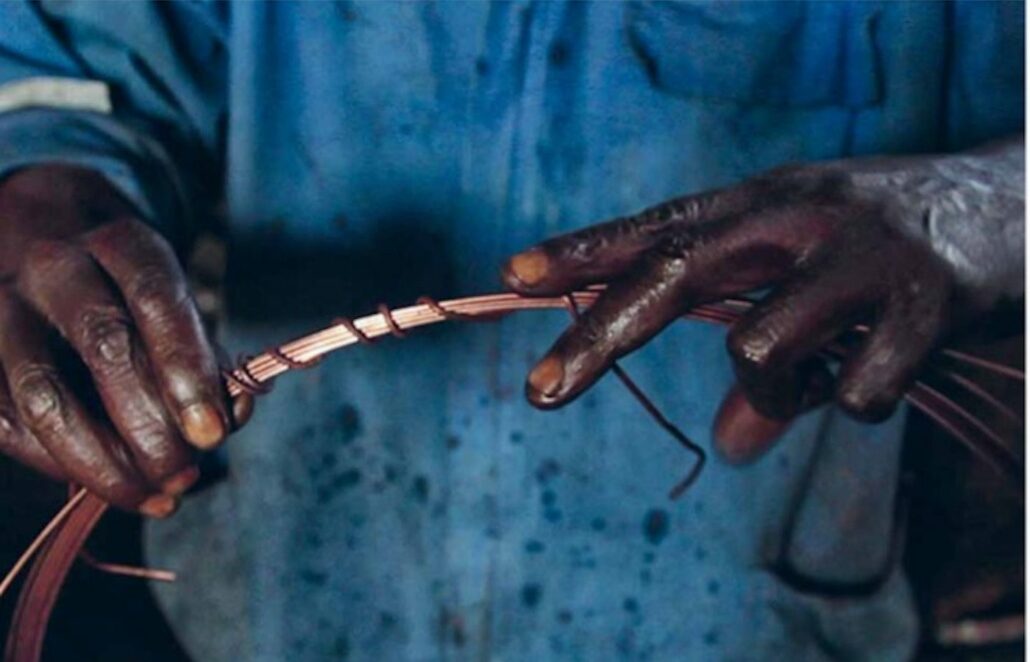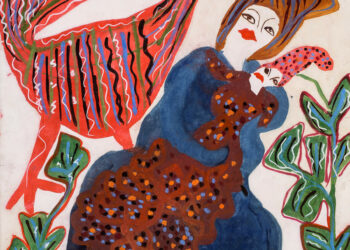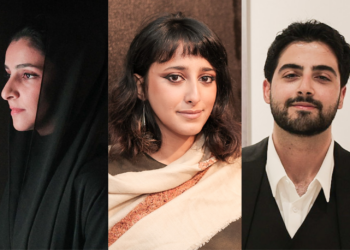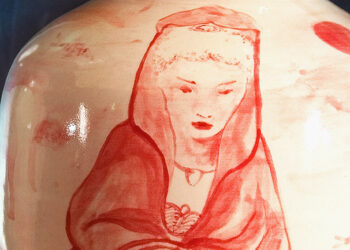Kunsthalle Mainz presents ‘Unextractable: Sammy Baloji Invites’ with artists: Sammy Baloji, Nilla Banguna, Jackson Bukasa & Dan Kayeye & Justice Kasongo, Sybil Coovi Handemagnon, Fundi Mwamba Gustave & Antje Van Wichelen , Franck Moka, Hadassa Ngamba, Isaac Sahani Dato, Georges Senga, Julia Tröscher.

Sammy Baloji, Tales of the Copper Crosses Garden: Episode 1, 2017. Video HD, 42 min. Courtesy Sammy Baloji & Mu.ZEE collection, Belgium.
In his artistic work Sammy Baloji repeatedly addresses the history of mining in and around his native city of Lubumbashi in the south-east of the Democratic Republic of Congo. He documents how the extractive industries have wreaked extensive destruction on the Katanga region and its social structures, transforming the land into resources and reducing entire societies to a mere pool of potential labourers. He juxtaposes to this harshness the memories, hopes and projects of people who live amidst the ruins of colonialism, industrial mining, and the global capitalist economy.
A central role in his work is played by an examination of the colonial archive: Baloji searches beyond pejorative representations and fixed ethnographic attributions for traces of practices and historical experiences that people conceived and passed down in spite and across the radical changes their societies were undergoing. He is currently pursuing these questions, which are incorporated into the exhibition in the form of collaborations and elements of research, in an artistic doctoral thesis. Collaborating with artists, activists, and theorists in order to develop collective structures is an ongoing aspect of Sammy Baloji’s work. The art center Picha, which he co-founded in 2008 with artist friends in Lubumbashi, plays a central role in such collaborative efforts. Since its establishment, the independent platform, run by artists and cultural producers, has hosted the Lubumbashi Biennale; its last edition in 2022 was devoted to the topic of ToxiCity. The Center also offers a residential and mentoring program called Atelier Picha primarily dedicated to young Congolese artists.
When he was invited to Kunsthalle Mainz it was only logical that Sammy Baloji extended the invitation to include other colleagues. He and curator & theorist Lotte Arndt invited 12 other artists from the DRC and Europe who worked with Picha in the past to Mainz. The result straddles disciplines, places and media to give rise to a collaborative-cum-collective undertaking that re-considers issues and approaches that were mainly developed in Lubumbashi in the context of Mainz and Germany.
Taking up the ideas of the last Lubumbashi Biennale, the exhibition is based on collective forms of artistic production, which seek to resist the ongoing toxic impact of economic, ecological, and socio-cultural exploitation. Some of the works on display were developed by artists participating in Atelier Picha, in cooperation with Framer Framed Amsterdam, others have been shown at the Lubumbashi Biennale, or are conceived in the context of the research project Reconnecting Objects and will be shown in Germany for the first time.
The exhibition is structured around three thematic clusters: Expropriating Land – the Transformation of Soil into Raw Material takes the foreground in the works of Franck Moka, Hadassa Ngamba and Georges Senga. Sybil Coovi Handemagnon, Isaac Sahani Dato, and Fundi Mwamba Gustave & Antje Van Wichelen focus on Confronting the Colonial Archive and Its Afterlives. In the works of Nilla Banguna, Julia Tröscher and Jackson Bukasa & Dan Kayeye & Justice Kasongo narrative and pictorial legacies practiced on the margins of urban modernity in often precarious circumstances are re- read and appropriated. One example of this is the Kasala, a poem that is recited and that celebrates the history of a person or community by combining genealogical and biographic elements with myths and narratives about the cosmic order of the world. For these artists the emphasis is on Transmission by Transformation.
The interwoven thematic threads are directly related to Sammy Baloji’s works from recent years as well as his current research, which investigates possible strategies for reconnecting interrupted chains of knowledge, the possibilities to rely on objects to this end, and above all transmission of gestures and narratives as a lived practice. With a focus sharpened by the collective structures they build, the artists are developing ever new forms and cooperations to resist extractivism.
The exhibition will be on view from the 27th of October, 2023, until the 11th of February, 2024. For more information, please visit Kunsthalle Mainz.



